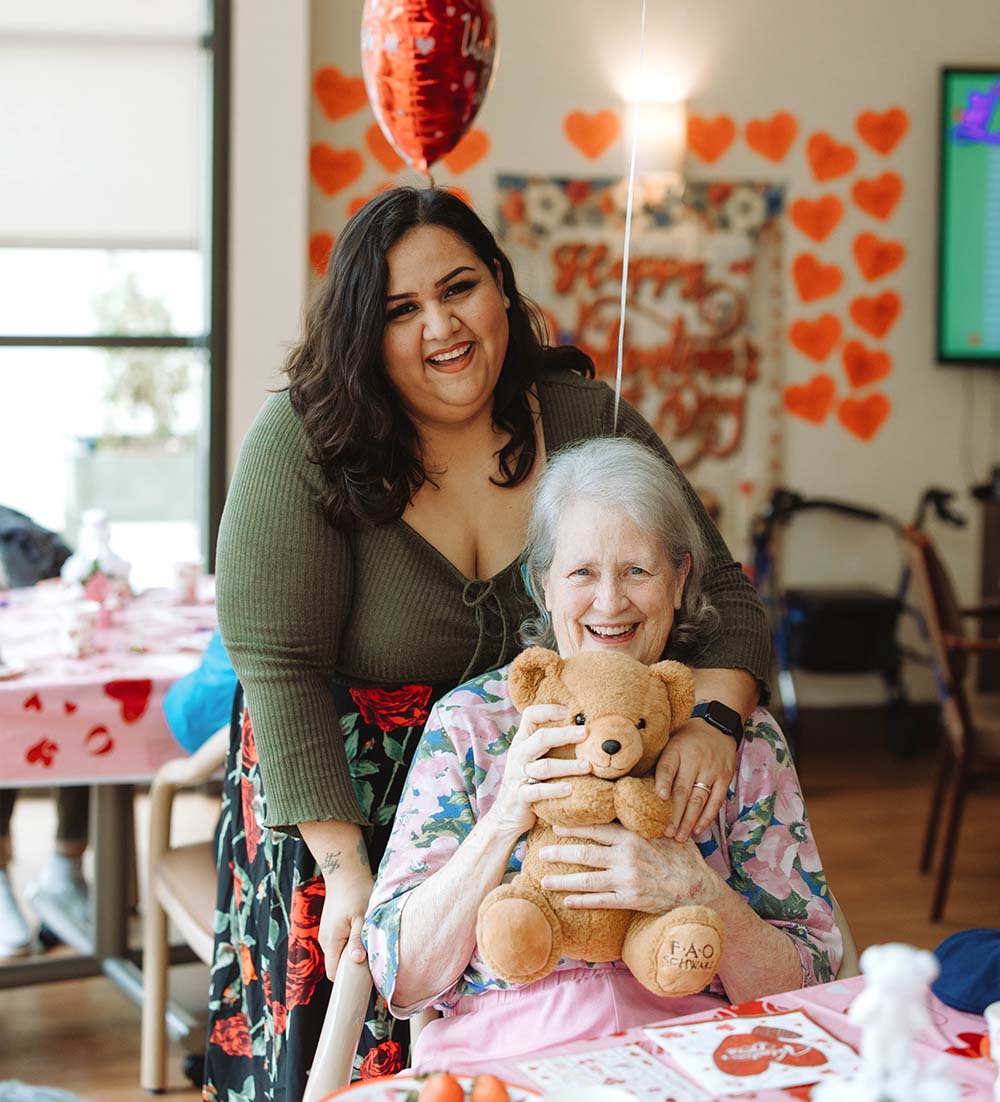Are you struggling to determine how best to care for a loved one with Alzheimer’s or dementia?
Navigating the onset of dementia with a loved one can be one of the most difficult challenges families face. Whether you’re beginning to notice their subtle memory lapses or managing the advanced stages of the disease, understanding your care options and identifying the right living environment are crucial steps toward establishing the best possible support system for them.
Understanding Dementia
Dementia is not a specific disease or mental illness, but a general term for a decline in cognitive abilities severe enough to interfere with daily life. Think of it as an umbrella term for conditions that affect memory, reasoning, and thinking. Alzheimer’s disease is the most common cause of dementia, accounting for 60-80% of cases. Other types include vascular dementia, dementia with Lewy bodies (DLB), and frontotemporal dementia (FTD). The symptoms of dementia can vary depending on the cause but often include memory loss, impaired judgment, difficulty communicating, confusion, and changes in mood and behavior.
Recent studies emphasize the benefits of early diagnosis in both managing symptoms and determining the best care strategies for seniors with dementia. Not only can it help families access treatments that slow the progression of the disease, but it can also give them more time to personally adapt to the changes in function and personality that may occur.
Diagnosis
According to the Alzheimer’s Association, there are a variety of laboratory and imaging tests that healthcare providers can use to rule out and detect causes of dementia. They may conduct a psychiatric evaluation or utilize a series of written or computerized neurocognitive tests to evaluate mental abilities. Keep in mind that there is no single test for determining if someone has dementia.
What is Memory Care?
Memory care provides specialized, long-term support for individuals with Alzheimer’s disease or other forms of dementia. While it shares some similarities with assisted living—such as help with meal preparation and daily activities like bathing and dressing—memory care places a greater emphasis on safety. Residents typically live in secure environments with 24-hour supervision to ensure their safety during periods of confusion or wandering.
Effective communication is another critical differentiator between memory care and assisted living. Trained memory caregivers will often need to “redirect” requests or frequently validate the feelings of an individual with dementia without escalating difficult emotions. For instance, a senior whose daughter lives in another state may ask anxiously, “Where is my daughter? She was supposed to pick me up two hours ago.” Responding calmly and compassionately in moments of confusion or agitation is a key component of memory care. In this example, a memory caregiver may respond by saying, “You daughter just called. She’s been stuck in traffic but should be here around 3pm.”
Remember that there is no one-size-fits-all approach to memory care. Every senior will require a different level of care, so choosing the best care program for your loved one’s needs will ensure the highest quality of life.
Memory Care Options for Seniors
Families face a series of care decisions when a loved one is diagnosed with Alzheimer’s or dementia. These decisions are never easy, especially with so many variables at play. The choice between home care and residential care, for instance, may depend on the progression of the disease, available support systems, the individual’s preferences, and the cost of care. If you or a family member are wondering about your options for memory care, below are some options to consider.
Home Care: In-home memory care allows seniors with dementia to remain in familiar surroundings, which can help provide comfort and reduce confusion. Families may opt to provide this care themselves for as long as they can, but as dementia progresses over time, hiring a home care professional will be necessary to manage the increased level of care. These in-home memory care providers are specially trained to help with ADLs (activities of daily living), medication management, meals, and daily activities. Note that Medicare may provide some coverage for home care, but precise criteria must be met, and other forms of care [such as support with ADLs] are not covered.
Residential Care: Residential communities that offer memory care can provide a more structured environment for seniors with dementia. This option includes round-the-clock supervision, strict safety measures, and tailored activities that promote cognitive stimulation. Since residential memory care facilities can offer more opportunities for companionship and social engagement than home care, many families prefer this option if the cost is within their means.
Understanding your loved one’s level of care is crucial for making informed decisions that promote their well-being. If you’ve determined that residential care is the best option for your loved one, here are some things to remember when searching for the right memory care community.
How to Choose the Right Retirement Home
There are several things to consider while searching for the best retirement home or memory care community for your loved one:
Location and Environment: The community should be conveniently located for family visits and offer a safe environment for seniors with memory-related challenges. Dementia-friendly layouts and designs, such as clear signage and secure entrances, can help minimize confusion and optimize safety. Some communities, like St. Paul’s Plaza, are equipped with home-like features and specifically designed with family in mind so that visits with loved ones are as comfortable as possible.
Staff Expertise and Training: Be sure to inquire about the qualifications of the staff, particularly in dementia care. Nurses and caregivers should have received training in de-escalation, medication management, fall prevention, and communication specific to individuals with dementia. If you visit the community for a tour, pay close attention to how staff interact with residents. Do they compassionately redirect them in moments of confusion? Do they preserve their dignity while providing personal care? Consider these factors as well.
Programs and Activities: Meaningful activities tailored to the interests and abilities of seniors with dementia can significantly enhance their quality of life. Knowing this, you’ll want to look for a memory care community that offers a variety of engagement opportunities such as art classes, music therapy, exercise programs, or specific activities that your loved one may enjoy. Some communities like The Villa on Bankers Hill post their monthly memory care activities calendar on their website for residents and families to view in advance. You may want to compare activities calendars to determine which community hosts events that would engage your loved one the most.
Financial Considerations
It’s no secret that memory care can be costly. This is a significant consideration for families, especially since prices can vary and rise as care needs increase over time. Understanding your available financial resources, such as long-term care insurance, government assistance programs, and Medicaid/Medicare benefits, will be critical to your search for the right memory care community.
Family Involvement
It’s important to understand how each community engages with the families of its residents. Studies have shown that continued family involvement plays a crucial role in the success of memory care. When family members can work closely with care teams and maintain open communication channels, residents often show better progress and experience a higher quality of life.
Be sure to ask the reception desk or admissions team about their visitation policy and how much family members can be involved in monthly activities. If you plan on being active in your loved one’s life, you’ll want to choose the community that is most accommodating to family members who wish to visit often.
Resources and Support
Caring for a loved one with Alzheimer’s or another form of dementia can be emotionally taxing, even when done from a distance, so don’t forget to ask each community what resources they offer families who are just beginning their memory care journeys. Support groups or additional educational resources for caregivers may be provided by the community itself or available in your local area.
St. Paul’s Senior Services
At St. Paul’s, we know that choosing the right memory care community for your loved one is no easy task, and we especially understand how overwhelming the caregiver’s journey can be. With so many options out there, we are here to help your family make the most informed decision. If one of our communities is not the best fit for your loved one, we’ll help you find one that is.
Are you looking for a memory care community with an expert team that is passionate about working with seniors?

We offer memory care services at two of our residential communities: St. Paul’s Plaza in Chula Vista and The Villa on Bankers Hill in San Diego. Our dedicated admissions teams work closely with families to ensure a smooth and safe transition into our care, and our caregivers take the time to get to know each senior personally to help them feel safe and at home.
No matter where your loved one is on their memory care journey, you can rely on St. Paul’s to provide the award-winning care they deserve. To learn more about St. Paul’s Senior Services and our Reflections Memory Care Program, visit our website or talk to an admissions specialist today to schedule a visit.
About the Author: Nicole Antonacci
Nicole Antonacci is the Communications Specialist for St. Paul’s Senior Services. As a writer and photographer, she is passionate about amplifying senior voices and sharing their stories with the community. Through her writing, she aims to inspire seniors and their families to actively prioritize wellness.





